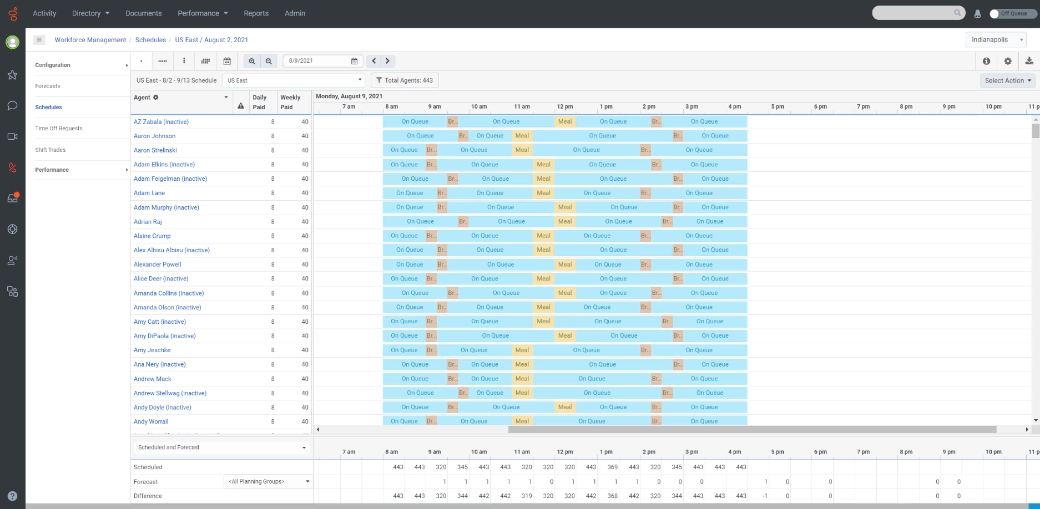
Generate, adjust and publish forecasts instantly using real-time data for accurate predictions and quick adaptations. This allows you to focus more on optimising processes, enhancing performance and improving operational efficiency.
Adapt quickly to unexpected changes and deviations in employee schedules. Meet your adherence and operational goals with the flexibility to fine-tune your plans swiftly, ensuring seamless operations and optimal performance.
Monitor service levels, occupancy and adherence in real time. Enhance time-off management and use work plan bidding to balance employee preferences with business objectives, ensuring both satisfaction and operational efficiency.

Continuously forecast up to two years ahead. Manage shrinkage and optimise staffing and schedules for better resource allocation, enhanced visibility and confident decision-making, reducing overtime and turnover.
Simplify schedule creation. Generate load-based schedules aligned with forecasts, create flexible schedules without forecasts or design blank schedules tailored by administrators, all ensuring optimal resource allocation and employee satisfaction.
Set rules and automate processes for overtime, time-off and trades, limits and approvals. Work plan bidding and the AI-driven Activity Planner optimise scheduling, ensuring smooth updates and minimal productivity disruptions.
Ensure your employees’ work-life balance. With the Genesys Tempo™ app, your employees can view their schedules, manage time-off requests, trade shifts, receive schedule updates and send late notifications seamlessly.
Help your human resources team improve the hiring process with tools from AppFoundry® Marketplace partners to assess and confirm candidates’ skills and ensure they’ll succeed in your contact centre.
From business units to planning groups, simplify and manage work distribution, permissions and specific needs, complying with labour rules. Flexible structures allow for optimal scheduling, seamless operations and smooth workflows.
Customers get better service when your employees are engaged and equipped to handle each interaction. Ensuring enough agents with the right skills are working at the right time keeps processes smooth and prevents burnout. And avoiding overstaffing keeps your operations under budget and working at maximum efficiency. Gain greater insight into your staffing needs and stay updated on your day-to-day operations with easy-to-use, natively integrated artificial intelligence (AI)-powered tools.
Achieve higher levels of accuracy, flexibility and speed. Monitor real-time service levels, occupancy and adherence to enhance time-off management. Identify and refine forecasts, work plans and scheduling rules to craft the perfect workforce management method, ensuring optimal performance. Empower employees with self-service tools for a more engaged and efficient workforce.
Streamline resource management with a single comprehensive tool for the best in workforce scheduling and labour forecasting. Create strategic data-driven plans and implement them with AI-powered automation to empower your agents and managers to achieve outstanding results.
Take forecasting accuracy to the next level with over 25 machine learning-trained models and advanced features, including Weighted Historical Index, Automatic Best Method and Ensemble Forecasting. Experience dynamic scheduling adjustments with real-time data access and industry-leading interfaces for enhanced visibility and decision-making. Enjoy one-click data clean-up, pattern and outlier identification, and algorithm selection. Optimise and generate load-based schedules, adjust and publish instantly, and notify agents via desktop or mobile interfaces.
Help supervisors adjust to changing conditions with intraday monitoring and real-time adherence views. Compare forecasts with actual activities like interaction volume, average handle time, service levels, average speed of answer and abandons across all channels for better decision-making. From business units to planning groups, combining skills- and schedule-based routing simplifies work distribution, ensures labour rule compliance, and maintains seamless operations and smooth workflows. This enhances efficiency and ultimately boosts customer satisfaction.
Improve day-to-day operations with AI-powered workforce management. Leverage AI-powered forecasting for accurate insights from current and historical data. Automated processes, auto-approvals and customisable rules reduce repetitive tasks, allowing managers to focus on strategic planning. Dynamic AI adjustments ensure optimal resource allocation and compliance with labour rules.
Employee self-service empowers your team to manage schedules, shift swap and work from anywhere, anytime — reducing the time-consuming burden of manual schedule reworking and enhancing efficiency and satisfaction.
Equip your customer service team, including supervisors, workforce management professionals and agents, with tools to stay engaged and deliver outstanding, empathetic experiences.
Workforce engagement management provides instant access to schedules, time-off requests and performance insights in an all-in-one solution. Managers and agents can quickly access the information they need for efficient job performance, gaining timely insights to act swiftly and achieve better results. Empower agents to manage their time, allowing leaders to focus on people — not numbers — with efficiency and empathy. Enhance communication, streamline processes and create a supportive environment that fosters productivity and satisfaction across your entire team.
Discover how real-time data and AI-powered forecasting boost contact centre performance and reduce costs. Long-term scheduling and accurate forecasting capabilities minimise unwanted overtime and reduce employee turnover rates. Request a demo to see how Genesys Cloud Workforce Engagement Management enhances operations, providing tools for effective future planning and addressing daily challenges. Experience improved efficiency, reduced costs and a more engaged workforce with Genesys Cloud WEM, enabling you to deliver outstanding customer service.
Thank you for your interest.
We’ll contact you directly to set up a date and time that works with your schedule.
Workforce forecasting involves predicting your future staffing needs based on current data and trends. This can involve analysing your current workforce, considering your strategic plans, assessing external factors and using statistical methods to predict future needs. It should consider factors like turnover, retirement, promotions and changes in demand.
Various tools can be used in workforce planning. Spreadsheets can be used for simpler needs, while more complex situations might require specialised workforce management software. These tools can help with forecasting, scenario planning and capacity planning. They can also provide features like data visualisation, what-if analysis and integration with other HR systems.
The benefits of using a workforce forecasting tool include more accurate forecasts, increased efficiency, better decision-making and improved strategic alignment. Such tools can help you optimise staffing levels, reduce costs and better prepare for future needs. They can also provide valuable insights and support more data-driven HR management.
A workforce forecasting tool can help your company’s bottom line by ensuring you have the right staffing levels. Having too few staff members can lead to poor service, missed opportunities and overworked employees. Or having too many staff members can lead to unnecessary costs. Accurate workforce forecasting also supports better strategic planning and more efficient resource allocation, contributing to improved profitability.
The “better” option between cloud-based and on-premises software for workforce forecasting depends on your specific needs and circumstances. Cloud-based software offers advantages like lower upfront costs, easier scaling and accessibility from anywhere. On-premises software might provide more control, better performance and potential advantages in terms of data security and compliance. It’s important to consider factors like cost, security, scalability and your IT resources when making this decision.
Shift bidding is the traditional scheduling method for enabling employees to pick their preferred shift pattern/schedule for a given period. Typically, this would follow the flow of the scheduler building a “dummy” or synthetic forecast and schedule based on employee profiles. The resulting schedule is then made available to the employees, and they can pick their preferences in order of seniority or performance.